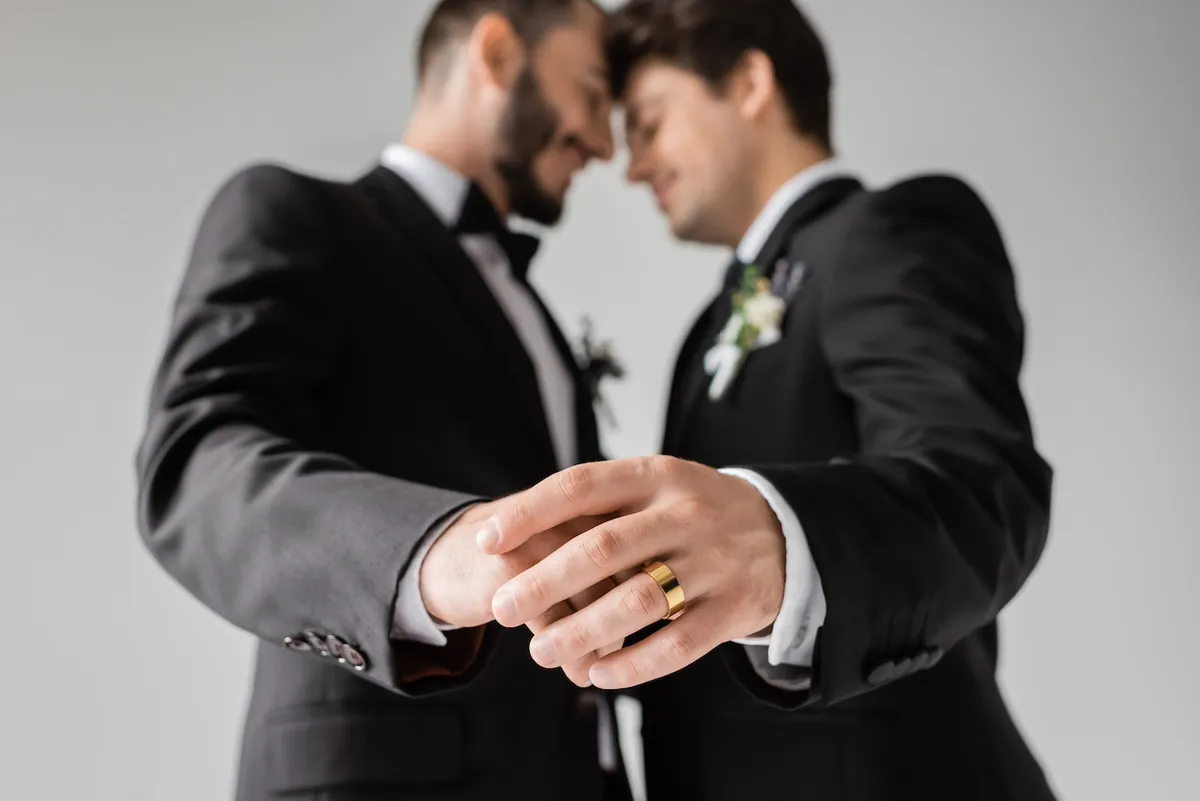
Understanding how laws change can be tricky, especially when it's about who can marry whom. Did you know that it wasn't until 2015 that same-sex marriage became legal across the entire United States? This article walks you through the journey of same-sex marriage laws, showing how love fought for its right to exist in the eyes of the law.
Stick around to see just how far we've come.
Early History of Same-Sex Marriage Laws
Activist debate and opposition arose in response to the early discussions of same-sex marriage laws, leading to various legal battles such as Hawaii's reaction and landmark cases like Lawrence v.
Texas and Baker v. Vermont. These events sparked the beginning of a long journey towards achieving marriage equality for same-sex couples.
Activist debate and opposition
People who wanted same-sex marriage had to fight hard. They said love was love and that all couples should be able to marry. But some people did not agree. They thought marriage should only be between a man and a woman.
This started many arguments across the country.
Many groups worked against these new laws for samesex couples. They thought changing marriage was wrong and could hurt families. Some folks used religion to say why it was not okay, while others feared big changes in society.
These debates were loud, with strong feelings on both sides.
Hawaii and reaction
Hawaii sparked national discussions about same-sex marriage when three gay couples sued the state for refusing to issue them marriage licenses. The Supreme Court of Hawaii ruled that denying marriage licenses to same-sex couples might be discriminatory, prompting significant debate and activism across the country.
This decision led to a strong reaction from opponents of same-sex marriage, who sought ways to prevent such unions from being legally recognized in other states.
The ensuing controversy in Hawaii set off a chain reaction of legal battles and social movements advocating for or against same-sex marriage rights throughout the United States. These events played a crucial role in shaping the evolving landscape of same-sex marriage laws and public attitudes towards LGBTQ+ rights at both state and national levels.
Lawrence v. Texas
In Lawrence v. Texas, the U.S. Supreme Court ruled that state laws banning consensual same-sex intimate conduct were unconstitutional. The case involved two men who were arrested for having sex in their own home and then charged under Texas' "Homosexual Conduct" law.
The court's decision invalidated similar laws in other states, marking a significant shift in legal recognition of same-sex relationships and impacting future LGBTQ rights cases across the United States.
This landmark ruling laid the groundwork for greater legal recognition of same-sex couples and affirmed their right to privacy and equal protection under the law. It became a pivotal moment in the ongoing struggle for marriage equality, setting a precedent for further advancements toward LGBTQ civil rights within the American legal system.
Baker v. Vermont
In Baker v. Vermont, three same-sex couples sued the state for not allowing them to marry. The court ruled that the denial of marriage rights to same-sex couples was unconstitutional.
This decision didn't legalize marriage but prompted conversations about legal recognition of same-sex relationships in the form of civil unions or domestic partnerships.
This case played a significant role in igniting debates and movements for legal recognition and equality for same-sex couples across different states, marking an important milestone in the ongoing struggle for LGBTQ rights advocacy.

Progress Towards Marriage Equality
Massachusetts became the first state to legalize same-sex marriage, leading to court rulings in Connecticut and legislation in other states - read on to learn about the ongoing progress towards marriage equality.
Massachusetts and reactions
In 2004, Massachusetts became the first state to legalize same-sex marriage. This decision sparked a mix of reactions across the nation, with some celebrating it as a historic victory for marriage equality while others voiced strong opposition.
The move set off a wave of debates and legal actions in other states, shaping the landscape of LGBTQ rights and prompting further legislative and judicial responses.
The landmark ruling in Massachusetts triggered both support and resistance, igniting discussions on marriage equality that reverberated far beyond state lines. It marked a pivotal moment in the ongoing struggle for LGBTQ rights, setting the stage for further legal battles and societal shifts related to same-sex marriage legislation nationwide.
Court ruling in Connecticut
Connecticut became the second state to legalize same-sex marriage after the court ruling in 2008, giving samesex couples the legal right to marry. The decision came after a lawsuit challenging the state's prohibition on gay and lesbian couples from marrying, marking progress towards marriage equality laws.
Connecticut joined Massachusetts as one of the first states to officially recognize marriage rights for samesex couples, setting an important precedent for future legal recognition of samesex partnerships.
This vital moment in LGBTQ history propelled the ongoing marriage equality movement forward and contributed to changing attitudes and legislation surrounding same-sex marriage across other states.
National political parties stance
The national political parties have shown a wide range of stances on the issue of same-sex marriage. The Democratic Party has generally been more supportive, advocating for marriage equality and LGBTQ rights.
On the other hand, the Republican Party has traditionally opposed same-sex marriage, often advocating for traditional definitions of marriage as between a man and a woman. However, there are individual members in both parties who hold differing views.
In recent years, there has been an evolution within some political parties regarding their positions on same-sex marriage. Some Republicans have expressed support for LGBTQ rights and even same-sex marriage, while some Democrats still remain cautious or opposed to it based on their personal beliefs or constituents' preferences.
Recent Developments
Iowa court decision and New Hampshire, Vermont, and Washington D.C. legislation have made significant progress towards marriage equality. The California decision and reversal, as well as the introduction of the National Respect for Marriage Act, also mark important recent developments in same-sex marriage laws.
Iowa court decision
In 2009, the Iowa Supreme Court unanimously ruled to legalize same-sex marriage, making it the third state in the U.S. to do so. The decision came after a lawsuit challenged the state's ban on same-sex marriage as unconstitutional.
This landmark ruling made Iowa one of the early adopters of marriage equality, setting an important precedent for LGBTQ rights across the country.
The court decision in Iowa was significant not only for its immediate impact but also for influencing other states' perspectives on same-sex marriage legislation and paving the way for further legal recognition of samesex couples nationwide.
New Hampshire, Vermont, and Washington D.C. legislation
New Hampshire, Vermont, and Washington D.C. passed legislation legalizing same-sex marriage in 2009. It was a significant step towards marriage equality in the United States.
- New Hampshire became the sixth state to legalize same - sex marriage on June 3, 2009.
- Vermont overrode a gubernatorial veto to legalize same - sex marriage on April 7, 2009.
- The District of Columbia Council approved legislation to legalize same-sex marriage on December 15, 2009, which later took effect in March 2010.
California decision and reversal
California had legalized same-sex marriage, but this decision faced strong opposition. In 2008, Proposition 8 passed, which defined marriage in California as between a man and a woman.
This reversed the previous ruling that allowed same-sex couples to marry. The legal battle continued with challenges against Proposition 8.
The California Supreme Court upheld the validity of the marriages that took place before Proposition 8 passed. However, it wasn't until 2013 that the U.S. Supreme Court ruled effectively striking down Proposition 8, allowing same-sex marriages to resume in California.
National Respect for Marriage Act
The National Respect for Marriage Act is a bill that seeks to overturn the Defense of Marriage Act, which states that marriage is between a man and a woman. This act would ensure that same-sex couples legally married in one state have their marriages recognized by the federal government, granting them the same rights and benefits as heterosexual couples.
The bill aims to provide equality and eliminate discrimination against LGBTQ couples, allowing them to enjoy the legal protections and privileges afforded to all married couples under federal law.
The National Respect for Marriage Act holds significant importance in advocating for equal rights within the LGBTQ community. If passed, it would mark a crucial step towards achieving nationwide recognition of same-sex marriage and promoting fairness in marital laws across different states.
Changes and Challenges
New York legislation, Washington and Maryland legislation, U.S. Supreme Court cases, state rulings and legislation (Rhode Island, Delaware, Minnesota, Hawaii, Illinois), ongoing struggles and progress.
To learn more about the ever-changing landscape of same-sex marriage laws and the challenges faced in achieving marriage equality for LGBTQ individuals across different states and countries, keep reading!
New York legislation
New York legislation on same-sex marriage has seen significant changes in recent years. After facing opposition for many years, New York legalized same-sex marriage in 2011, becoming the sixth state to do so.
This landmark legislation marked a crucial turning point and set an example for other states to follow suit, signifying a broader shift towards equality and inclusivity within the legal system.
The legalization of same-sex marriage in New York highlighted a progressive step forward in LGBTQ rights and recognition.
Washington and Maryland legislation
Washington and Maryland have made significant strides in same-sex marriage legislation. In 2012, voters in Washington approved Referendum 74, allowing for the legalization of same-sex marriage.
The law took effect later that year, making Washington one of the early states to legalize such unions through popular vote. Similarly, Maryland passed a same-sex marriage bill which was signed into law on March 1, 2012.
This marked a pivotal moment as it made Maryland the first state below the Mason-Dixon Line to legalize same-sex marriage.
U.S. Supreme Court cases
The U.S. Supreme Court cases regarding same-sex marriage have been pivotal in shaping the legal landscape.
State rulings and legislation (Rhode Island, Delaware, Minnesota, Hawaii, Illinois)
State rulings and legislation have been significant in the progress of same-sex marriage laws.
- Rhode Island legalized same - sex marriage in 2013, becoming the tenth U.S. state to do so.
- Delaware passed a law allowing same - sex marriage in 2013 after a fierce debate.
- Minnesota started allowing same - sex marriages in 2013 after passing legislation.
- Hawaii legalized same - sex marriage in 2013 after a special legislative session.
- Illinois approved same - sex marriage in 2013, becoming the fifteenth U.S. state to do so.
Ongoing struggles and progress
Many states continue to face ongoing struggles and progress in the legalization of same-sex marriage. The U.S. Supreme Court has been pivotal in several landmark cases, shaping the legal landscape for LGBTQ marriage rights across the nation.
In addition, various states such as New York, Washington, Maryland, Rhode Island, Delaware, Minnesota, and Hawaii have seen significant developments through court rulings and legislation.
These continuous struggles and achievements mark a dynamic shift in public policy towards greater equality for same-sex couples.

Conclusion
In conclusion, the history of same-sex marriage laws has seen significant progress and challenges. Court rulings and legislative changes have shaped the landscape of marriage equality.
The practicality and efficiency of these developments highlight their importance in ensuring equal rights for all individuals. These strategies can lead to significant improvements in societal acceptance and legal recognition.
Readers are encouraged to explore further resources and stay informed about ongoing developments in this crucial area of law. Let's continue working towards a society where every individual is treated with dignity and respect under the law.
Get legally married online
In partnership with Courtly, get legally married online.
From start to “I do.” Courtly team is fully committed to the cause: getting you married. They've done more remote weddings than anyone. Thousands of couples have counted on Courtly and we know what it takes to secure your legal marriage certificate.
Also, enjoy an exclusive discount available only to the MarryOnChain community! Use code MARRYONCHAIN to get $75 off your wedding.
RelatedRelated articles
All posts

